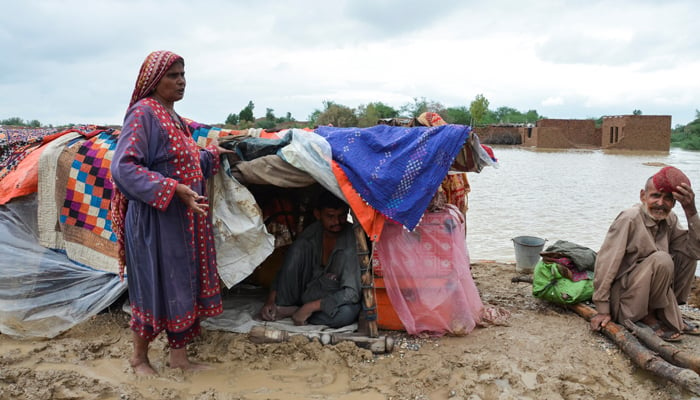This is climate hell
Despite clear and present dangers, there remains lack of commitment to adopting eco-friendly business practices
July 30, 2024

As the world strives to meet the Paris Agreement’s target of limiting temperature rise to 1.5°C above pre-industrial levels, nature has issued a stark reminder of the urgent need for action. This year, the planet experienced its hottest day in 100,000 years, a record that has heightened global concerns about the accelerating pace of climate change.
On July 4 this year, global temperatures averaged 17.23° (63.01°F), marking an unprecedented milestone. This extreme heat is part of a broader trend driven by human activities, notably the burning of fossil fuels and deforestation. The resulting heatwave has led to severe wildfires, droughts, and health crises worldwide.
The record temperatures stem from increased concentrations of greenhouse gases in the atmosphere. Carbon dioxide levels have reached 420 parts per million, the highest in human history. Methane and nitrous oxide levels have also risen significantly, trapping heat and warming the planet.
Climate models have long predicted that continued greenhouse gas emissions would lead to more frequent and severe heatwaves. The recent temperature record confirms these predictions. The Intergovernmental Panel on Climate Change (IPCC) warns that if current emission trends persist, global temperatures could rise by 1.5°C above pre-industrial levels within the next decade, intensifying extreme weather events.
The effects of this historic heat are already evident. Wildfires have devastated regions like the Mediterranean, the Western United States, and Australia, destroying forests and wildlife habitats. In many areas, heat and drought have led to crop failures, threatening food security and livelihoods.
Marine ecosystems are under severe stress. Coral reefs are experiencing widespread bleaching, and warmer ocean temperatures are disrupting marine food chains. The Arctic is warming at more than twice the global average rate, leading to ice sheet melt and habitat loss for species like polar bears and walruses.
Extreme heat poses significant health risks, particularly for vulnerable populations such as the elderly, children, and those with pre-existing conditions. Heat-related illnesses, including heatstroke and dehydration, have surged. Urban areas, with their dense populations and heat-absorbing infrastructure, are especially affected. In countries like Pakistan, where power outages, water shortages, and limited green spaces are common, the crisis is even more severe.
Agriculture, reliant on stable weather patterns, faces unprecedented challenges. Heat and drought are reducing crop yields, driving up food prices, and increasing food insecurity. This inaction is a stark reminder of the urgent need for environmental stewardship and proactive measures. The consequences of ignoring these issues are dire, threatening not only our current way of life but also the future of our planet. It’s time for decisive leadership and responsible behavior to address these pressing climate challenges.
Experts speculate the heatwave will badly impact the rice crop in Sindh and Punjab. It’s not just Pakistan; neighbouring countries in the Asia region also face the similar crisis threatening agriculture.
The hottest day in 100,000 years serves as a dire warning: immediate and decisive action is needed to combat climate change. With COP29 approaching in November, the world must question whether slow climate negotiations can keep pace with nature’s rapid climate shocks. Human greed, driven by profit from fossil fuels, continues to hinder progress, despite the availability of renewable energy sources like wind, solar, green hydrogen, and hydroelectric power.
Industries often resist adopting energy-efficient technologies to save costs, exacerbating the crisis. In water-scarce countries like Pakistan, the real-estate sector uses fresh water for construction, ignoring the potential to treat and reuse millions of gallons of wastewater that currently pollute marine environments.
The affluent class’s relentless pursuit of land for housing and real estate has led to massive deforestation and ecosystem destruction. Urban sprawl has consumed fertile agricultural areas in Punjab and Sindh, threatening national food security. Despite experiencing extreme climate events, there is a glaring lack of planning for resilience. In Karachi, valuable coastal real estate is developed without considering tidal pressures and the need for disaster preparedness.
The extreme heat this summer, coupled with a declining quality of life, has failed to spur those in power or those with resources into action. Despite the clear and present dangers, there remains a lack of commitment to adopting eco-friendly business practices.
Untreated municipal and industrial sewage continues to pollute the seas, power outages are rampant, and excessive electricity bills dominate the headlines. Yet, everything continues as if it’s business as usual. It’s akin to a home burning down while its occupants play the fiddle, oblivious to the flames.
The writer is an expert on climate change and sustainable development and the founder of the CliftonUrban Forest. He tweets/posts@masoodlohar and can be reached at: [email protected]
Originally published in The News











